(新课标)Unit 2 Numbers Period 1 Reading 教学设计
文档属性
| 名称 | (新课标)Unit 2 Numbers Period 1 Reading 教学设计 | 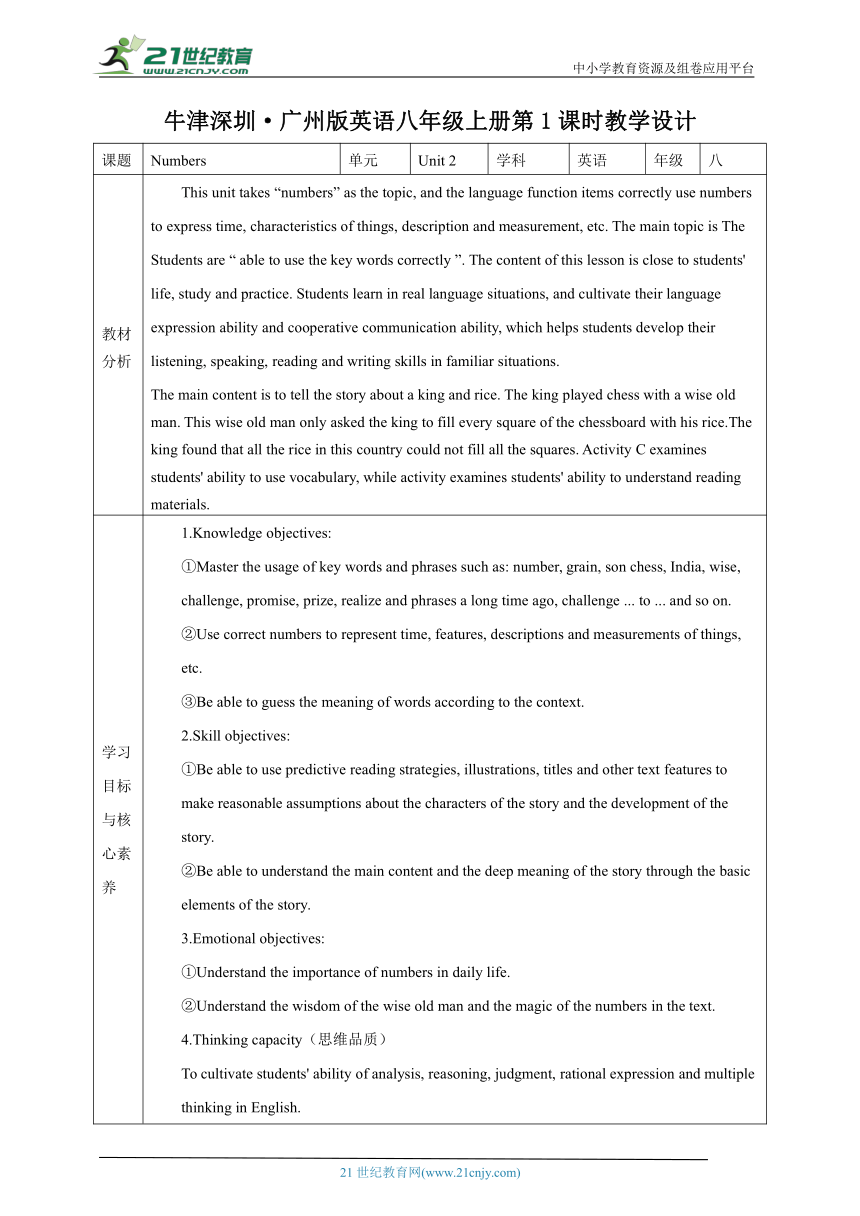 | |
| 格式 | doc | ||
| 文件大小 | 1.2MB | ||
| 资源类型 | 试卷 | ||
| 版本资源 | 牛津深圳版 | ||
| 科目 | 英语 | ||
| 更新时间 | 2022-08-02 16:35:16 | ||
图片预览

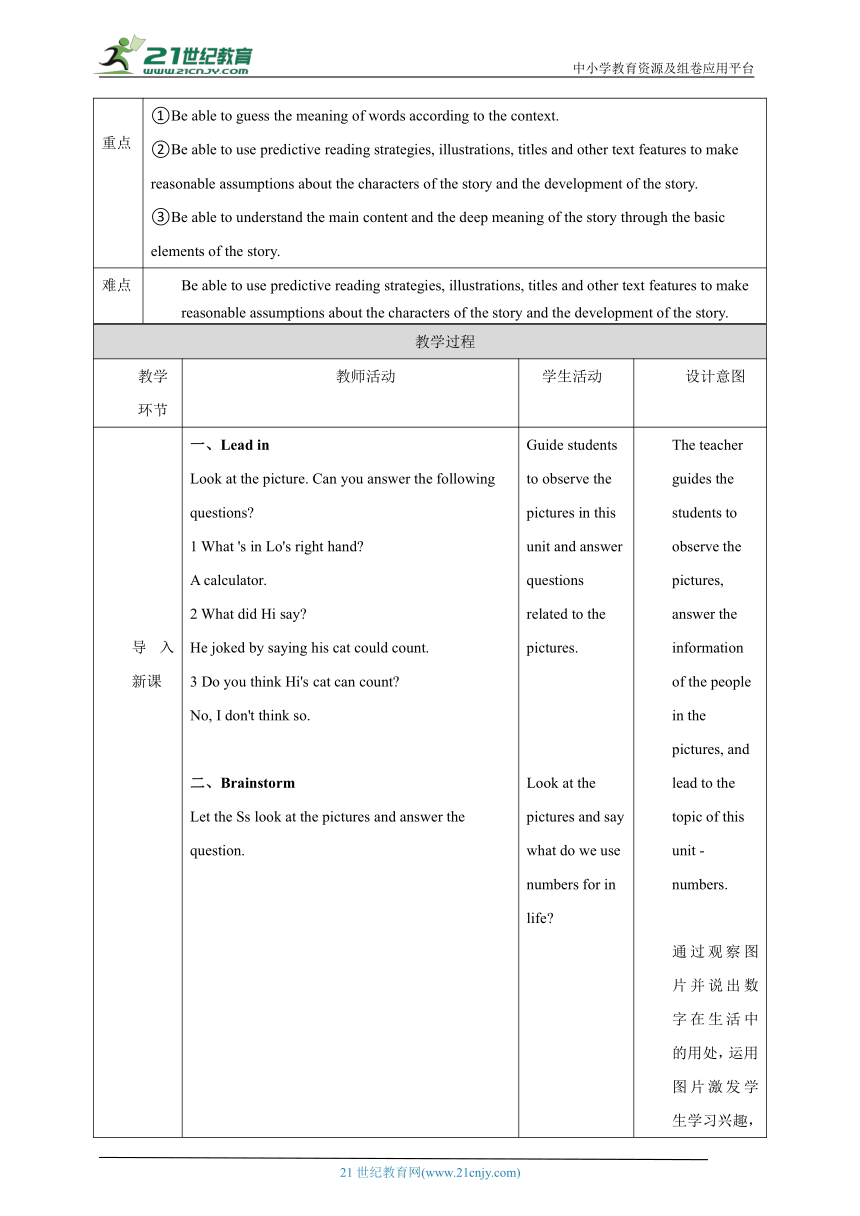
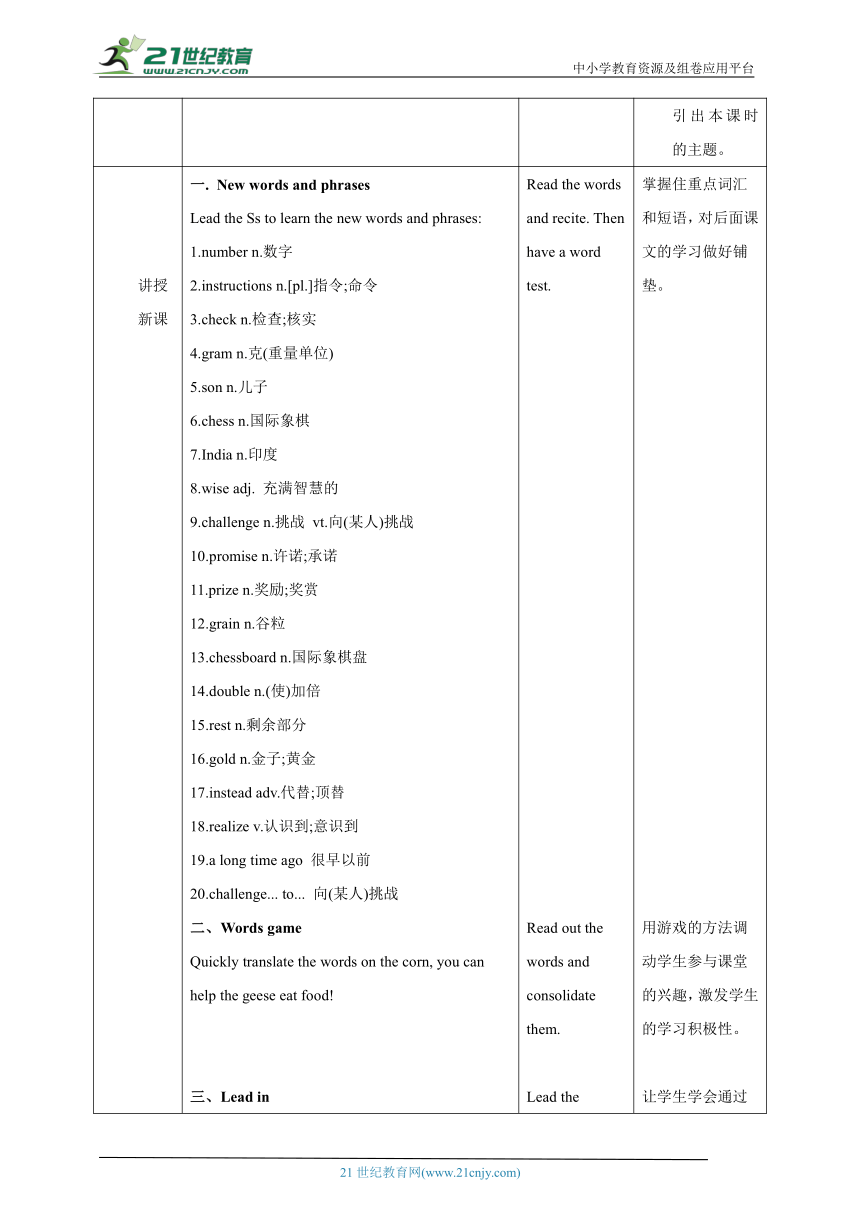
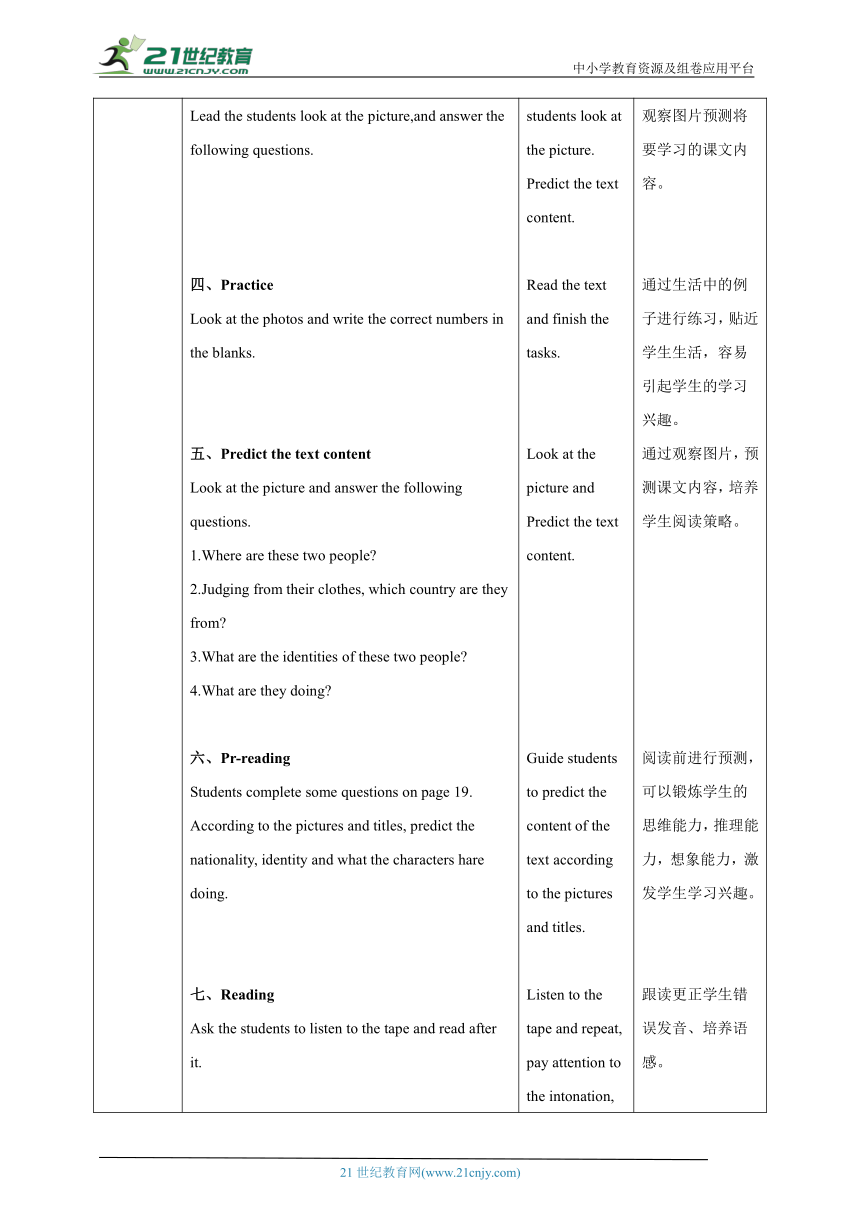
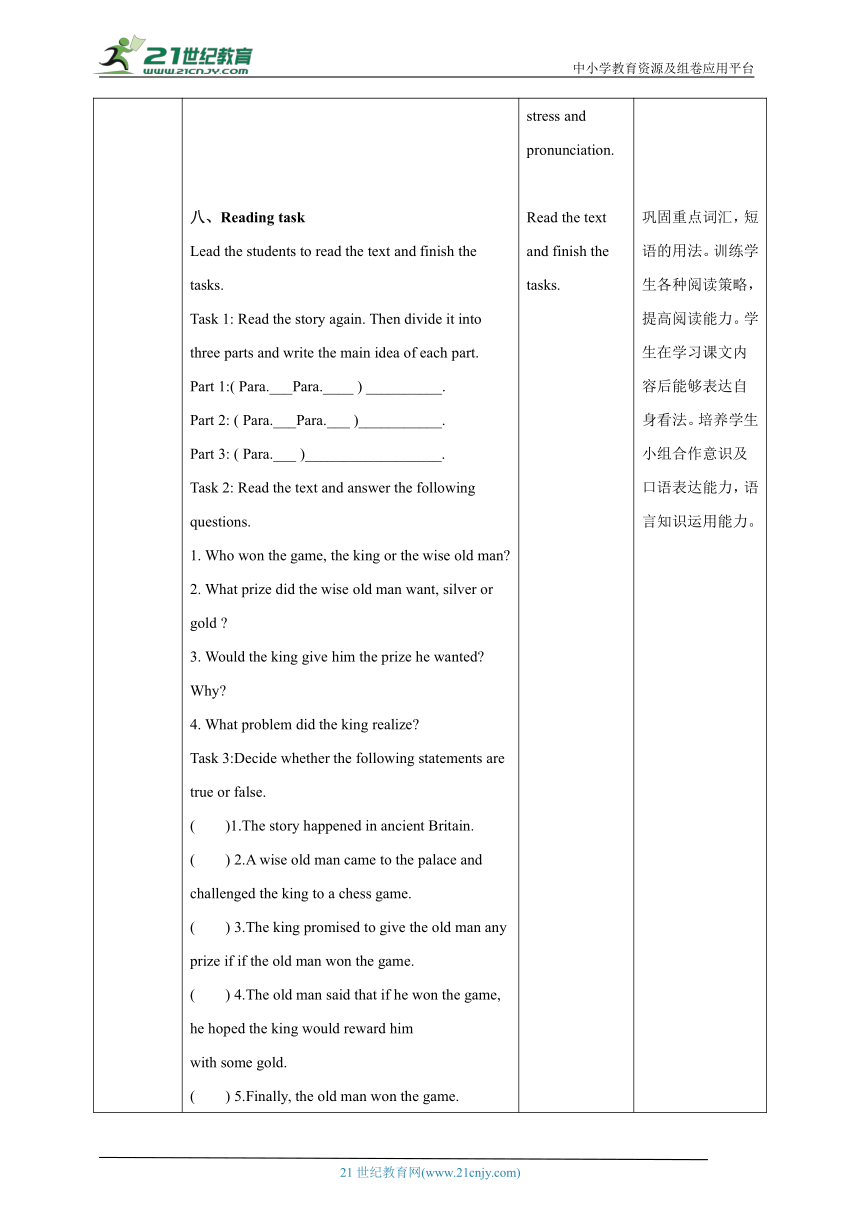
文档简介
中小学教育资源及组卷应用平台
牛津深圳·广州版英语八年级上册第1课时教学设计
课题 Numbers 单元 Unit 2 学科 英语 年级 八
教材分析 This unit takes “numbers” as the topic, and the language function items correctly use numbers to express time, characteristics of things, description and measurement, etc. The main topic is The Students are “ able to use the key words correctly ”. The content of this lesson is close to students' life, study and practice. Students learn in real language situations, and cultivate their language expression ability and cooperative communication ability, which helps students develop their listening, speaking, reading and writing skills in familiar situations. The main content is to tell the story about a king and rice. The king played chess with a wise old man. This wise old man only asked the king to fill every square of the chessboard with his rice.The king found that all the rice in this country could not fill all the squares. Activity C examines students' ability to use vocabulary, while activity examines students' ability to understand reading materials.
学习目标与核心素养 1.Knowledge objectives: ①Master the usage of key words and phrases such as: number, grain, son chess, India, wise, challenge, promise, prize, realize and phrases a long time ago, challenge ... to ... and so on.②Use correct numbers to represent time, features, descriptions and measurements of things, etc. ③Be able to guess the meaning of words according to the context.2.Skill objectives:①Be able to use predictive reading strategies, illustrations, titles and other text features to make reasonable assumptions about the characters of the story and the development of the story.②Be able to understand the main content and the deep meaning of the story through the basic elements of the story.3.Emotional objectives:①Understand the importance of numbers in daily life.②Understand the wisdom of the wise old man and the magic of the numbers in the text.4.Thinking capacity(思维品质)To cultivate students' ability of analysis, reasoning, judgment, rational expression and multiple thinking in English.
重点 ①Be able to guess the meaning of words according to the context. ②Be able to use predictive reading strategies, illustrations, titles and other text features to make reasonable assumptions about the characters of the story and the development of the story.③Be able to understand the main content and the deep meaning of the story through the basic elements of the story.
难点 Be able to use predictive reading strategies, illustrations, titles and other text features to make reasonable assumptions about the characters of the story and the development of the story.
教学过程
教学环节 教师活动 学生活动 设计意图
导入新课 一、Lead inLook at the picture. Can you answer the following questions 1 What 's in Lo's right hand A calculator.2 What did Hi say He joked by saying his cat could count.3 Do you think Hi's cat can count No, I don't think so.二、BrainstormLet the Ss look at the pictures and answer the question. Guide students to observe the pictures in this unit and answer questions related to the pictures.Look at the pictures and say what do we use numbers for in life The teacher guides the students to observe the pictures, answer the information of the people in the pictures, and lead to the topic of this unit - numbers.通过观察图片并说出数字在生活中的用处,运用图片激发学生学习兴趣,引出本课时的主题。
讲授新课 New words and phrasesLead the Ss to learn the new words and phrases:1.number n.数字 2.instructions n.[pl.]指令;命令3.check n.检查;核实 4.gram n.克(重量单位)5.son n.儿子 6.chess n.国际象棋7.India n.印度 8.wise adj. 充满智慧的9.challenge n.挑战 vt.向(某人)挑战 10.promise n.许诺;承诺11.prize n.奖励;奖赏 12.grain n.谷粒13.chessboard n.国际象棋盘 14.double n.(使)加倍15.rest n.剩余部分 16.gold n.金子;黄金17.instead adv.代替;顶替 18.realize v.认识到;意识到19.a long time ago 很早以前 20.challenge... to... 向(某人)挑战二、Words gameQuickly translate the words on the corn, you can help the geese eat food! 三、Lead inLead the students look at the picture,and answer the following questions.四、PracticeLook at the photos and write the correct numbers in the blanks.五、Predict the text contentLook at the picture and answer the following questions.1.Where are these two people 2.Judging from their clothes, which country are they from 3.What are the identities of these two people 4.What are they doing 六、Pr-readingStudents complete some questions on page 19. According to the pictures and titles, predict the nationality, identity and what the characters hare doing.七、ReadingAsk the students to listen to the tape and read after it.八、Reading taskLead the students to read the text and finish the tasks.Task 1: Read the story again. Then divide it into three parts and write the main idea of each part.Part 1:( Para.___Para.____ ) __________.Part 2: ( Para.___Para.___ )___________.Part 3: ( Para.___ )__________________. Task 2: Read the text and answer the following questions.1. Who won the game, the king or the wise old man 2. What prize did the wise old man want, silver or gold 3. Would the king give him the prize he wanted Why 4. What problem did the king realize Task 3:Decide whether the following statements are true or false.( )1.The story happened in ancient Britain. ( ) 2.A wise old man came to the palace and challenged the king to a chess game. ( ) 3.The king promised to give the old man any prize if if the old man won the game.( ) 4.The old man said that if he won the game, he hoped the king would reward him with some gold.( ) 5.Finally, the old man won the game.( ) 6.All the rice in the country is enough to be put on all the squares.Task 4: Guide students to complete the exercises C 1 on page 20 of the textbook.Task 5:Guide students to complete the exercises C 2 on page 20 of the textbook.Task 6: Guide students to complete the exercises D 1 on page 21 of the textbook.Task 7:Guide students to complete the exercises D 2 on page 21 of the textbook.Task 8:Guide students to complete the exercises D 3 on page 21 of the textbook.九、DiscussionIf you were the old man/ the king, what would be a wise way to solve the problem 十、Language pointsLead the Ss to learn the language points.1. Read a story about numbers.读一个关于数字的故事。number n.数字;数;号码 v.标号;给......编号number此处用作可数名词,意为“数字”。number 还可表示“号码”。We often use Arabic numbers in our daily life.在我们的日常生活中我们经常使用阿拉伯数字。What's your telephone number 你的电话号码是多少 number还可用作及物动词,意为“标序号; ......编号”Please number the pictures.请给这些图片编上序号。根据中文含义填空①Check the _________ (数字) below against the numbers on your card.② Give each picture a _________ (号码) corresponding to its position on the page.答案:numbers,number2. Check some Maths problems. 检查一些数学题。(1)check及物动词,意为“检查;核实”。Our teachers check our homework every day.我们的老师们每天都检查我们的作业。Please check the answers.请核对答案。check的相关短语:check in登记;检票 check out办清手续后离开 check up检验语法填空①Please check ___ at least an hour before departure.②Guests must check ____ before noon, or they will be charged for the day. 答案:in,out(2)problem 可数名词,意为“问题;难题;困难”。He worked out the Maths problem.他算出了那道数学难题。These are the problems of youth.这些是青少年的问题。 同义词辨析:question 和 problem ①question n.问题;通常指以口头或书面形式提出来要求回答或有待讨论解决的问题。例证:She always asks difficult questions.她总是问些不好回答的问题。②problem n.难题,问题; 指客观存在的、难以处理或理解的问题,多为引起担心或造成困难的具体事情。例证:The problem is how we can get the raw material.问题是我们怎样才能得到原材料。根据中文含义填空①We need to take a different approach to the __________ (问题).②Scientists took a completely different approach to the __________ (难题).答案: problem, problem3. Playing chess.下国际象棋。chess是不可数名词,意为“国际象棋”,与play连用时,其前不加冠词。My grandfather likes playing chess when he is free.空闲时,我爷爷喜欢下国际象棋。(1)球类、棋类等名词与动词p1ay搭配时,前面不加冠词,但西洋乐器名词前通常用定冠词the。(2) chessboard n.国际象棋棋盘 chessman n.国际象棋棋子单项选择题My sister practices playing ________ piano for the coming talent show.A.a B.an C.the D./答案:C4.One day, a wise old man came to the palace and the king challenged him to a game.有一天,一位睿智的老人来到宫殿,国王邀请他玩一个游戏。challenge n.挑战 vt.向(某人)挑战The role will be the biggest challenge of his acting career.扮演这个角色将是他演艺生涯中最大的挑战。challenge n.意为“挑战”,常与介词to连用,引出挑战的对象; challenge to the world对世界的挑战。语法填空In the singing contest, all the people will _______ each other _______ the same song.A. keep; offB. copy; downC. challenge; to答案:C5. The king promised the old man,“You can have any prize if you win the game.国王向老者承诺:“如果你赢得比赛,你可以得到任何的奖赏。”(1)promise v.许诺;承诺;保证n.诺言;许诺;承诺①此处用作及物动词,表示“许诺;承诺”,其后可接双宾语或动词不定式作宾语。promise to do sth.意为“许诺或承诺做某事”。promise sb.sth. (= promise sth.to sb.)许诺某人某事;promise (sb.)+ that从句“承诺 (某人) ......”。She promised me the book.她许诺(给)我这本书。They promised to come to the party on time.他们答应准时来参加聚会。②promise也可用作名词, keep a promise信守诺言; break a promise违背诺言; make a promise 许下诺言;答应;保证My mother made a promise to buy a new bike for me.我母亲答应给我买一辆新自行车。语法填空—— Jim said you were going to hold a welcome party for Tom.——How could he tell you about that He _______ that he wouldn't tell anyone.A. promised B. meant C. thought答案:A②if连词,意为“如果”,引导条件状语从句。if引导的条件状语从句可以放在主句之后,也可以放在主句之前。当条件状语从句位于主句之前时,后面要用逗号与主句隔开。If it rains, I won't go swimming.如果下雨,我不会去游泳。含有if计引导的条件状语从句的主从复合句,要遵循“主将从现”的原则即主语用一般将来时(或含有情态动词、为祈使句),if引导的条件状语从句则用一般现在时。语法填空We'll go to visit the Great Wall ___ it is fine tomorrow.答案:if6. ...I'd like one grain of rice for the first square of the chessboard... ......我想在棋盘的第一个方格要一粒谷粒......would like意为“想要”,在意思上相当于want,但在语气上比want委婉,常用于口语中。would是情态动词,没有人称和数的变化。would like后常接名词、代词或动词不定式,但不可接动名词。I would like some apples.我想要些苹果。He would like to eat some bananas.他想吃些香蕉。(1)当我们或回答某人需要什么时,可以在would like后面直接跟名词作宾语。对于would like提出的建议或要求肯定回答可以说"Yes, please.”,否定回答可以说“No, thanks.”——Would you like some iced tea 你想喝点儿冰茶吗 ——Yes, please./No, thanks.好的,请来一点儿。/不,谢谢。(2)回答“Would you like to do sth. ”句型时,肯定回答常用“Yes, I'd love/like to.”,否定回答常用“I'd love to, but...”。——Would you like to stay here with me 你愿意和我一起待在这儿吗 ——Yes, I'd love to.是的,我愿意。(3)would like sb. to do sth.意为“想要某人做某事”。I'd like you to go with me.我想让你和我一起去。语法填空①He asked his daughter what she _________ (想要) for her birthday.②——Would you like to stay and have dinner ——Yes,_____________.答案:would like;I'd love/like to7. ... and then double the amount for each of the rest of the squares .......然后剩余的每个方格所放米的数量都是前一个方格的两倍。( 1 ) double①[及物动词]使加倍The baby doubled its weight in a year.那个婴儿一年中体重增加了一倍。②[不及物动词]加倍To my surprise, the price of the coat doubled.令我吃惊的是,外套的价格翻倍了。③[形容词]两倍的;成双的;双重的The word has a double meaning.这个词有双重意思。④[不可数名词]两倍;双倍Four is the double of two.四是二的两倍。根据中文含义提示填空①Behind every painstaking effort will be ________ (加倍) reward.②Behind every painstaking effort will be ________ (加倍的)reward.答案:double;double(2)the rest意为“剩余的部分人/事物”。the rest of +名词意为“剩余......”。常见用法有:the rest of +不可数名词→谓语动词用单数the rest of +可数名词复数→谓语动词用复数The rest of the workers are from the city.其余的工人来自这座城市。The rest of the money is mine.剩余的钱是我的。语法填空You had better put the_______ of food into the refrigerator because the weather is hot.A. amount B. other C. rest D. left答案:C8. he would still not have enough rice to put on all the squares!......他仍然没有足够的米来放满所有的格子。enough det.足够的;充足的;充分的pron.足够;充足;充分adv.足够地;充分地;充足地There isn't nearly enough time to get there now.现在根本没有足够的时间赶到那儿。 Health depends on food, exercise and enough sleep.健康取决于食物、运动和充足的睡眠。(1)在句中多作定语,一般修饰复数名词或不可数名词,置于名词前后均可。I have enough time/ time enough to finish the work.我有足够的时间来完成这项工作。(2)enough 还可用作副词,意为“足够地”,置于所修饰词的形容词,副词或动词后。(3)be (not)+形容词或副词+enough to do sth.意为“(不)足够......做某事”,可与so... that...或too... to结构进行转换。语法填空It was ________ for us to solve the math problem. Few of us could even understand it.easy enough B. enough easy C. difficult enough D. enough difficult答案:A9. “I can teach you how to make more money if you promise to follow my advice”.如果你承诺采纳我的建议,我可以教你如何去赚更多的钱。(1)how to make more money是“疑问词+动词不定式(短语)"结构,意为“如何去赚更多的钱”,在句中作teach的宾语。疑问代词或副词what / who / whom/which/where/when/how后跟动词不定式(短语),常用作动词know/tell/ask/teach等的宾语。He asked me where to park his car.他问我该把他的车停在哪里。(2) advice不可数名词,意为“建议”。表示“一条建议"用a/one piece of advice,表示“一些建议”用some advice。I'll give you some advice on how to look after your pet dog.我将给你一些怎样照顾你的宠物狗的建议。的车停在哪里。语法填空Could you please teach me ____ (how, when, what) to make a home page 答案:how Read the words and recite. Then have a word test. Read out the words and consolidate them.Lead the students look at the picture. Predict the text content.Read the text and finish the tasks.Look at the picture andPredict the text content.Guide students to predict the content of the text according to the pictures and titles.Listen to the tape and repeat, pay attention to the intonation, stress and pronunciation.Read the text and finish the tasks.Students discuss in groups and exchange their views.Learn the language points. 掌握住重点词汇和短语,对后面课文的学习做好铺垫。用游戏的方法调动学生参与课堂的兴趣,激发学生的学习积极性。让学生学会通过观察图片预测将要学习的课文内容。通过生活中的例子进行练习,贴近学生生活,容易引起学生的学习兴趣。通过观察图片,预测课文内容,培养学生阅读策略。阅读前进行预测,可以锻炼学生的思维能力,推理能力,想象能力,激发学生学习兴趣。跟读更正学生错误发音、培养语感。巩固重点词汇,短语的用法。训练学生各种阅读策略,提高阅读能力。学生在学习课文内容后能够表达自身看法。培养学生小组合作意识及口语表达能力,语言知识运用能力。分组讨论,训练学生独立思维能力,表达能力,与他人合作的。总结本部分所学单词及短语。
课堂练习 一、根据中文提示填空1.Please c_______ your answer again. You have five more minutes.(根据首字母填空)2.Gu Ailing won two ________ (金子) medals during Beijing 2022 Olympic Winter Games.(根据汉语提示填空)3.A New Year’s resolution is a kind of ________ (承诺) people make to themselves at the beginning of the year.(根据汉语提示填空)4.I can’t decorate my house by myself. So I will pay someone to do it _________.(根据句意填空)5.We should never give up trying to ________ our dreams no matter what is in front of us.(根据句意填空)参考答案:1.(c)heck2.gold 3.promise4.instead5.realize二、短文汉语提示填空根据短文内容和所给中文提示,在空白处写出单词的正确形式。每空限填一词。 Thousands of years ago, there lived a king. His people loved him, because he always ___1___ (对待) them well. He would often ask some ___2___ (聪明的) people to look at his work and talk with them. The king built some ___3___ (活泼的) things. As he grew old, the king thought, “I will build a perfect palace to remember my whole life. It will be the best one in the world.” In a month, the king worked out a ___4___ (模型) for his palace.He ___5___ (邀请) many people to get their ideas about it.“The best one on earth!” all the people said, ___6___ (除了)an old man. The king turned to the old man and asked,“Why are you in ___7___ (沉默) Don’t you think that my palace will be a perfect one ”The old man ___8___ (解释), “It may take thousands of workers a whole lifetime to build it, working day and night. Your palace will cost a lot of money, which must come from your people. If your people will live an ___9___ (极讨厌的) life because of this building, how perfect can it be ”The king thought for a while and thanked his ___10___ (客人) for his words. He decided to give up his plan and care more about people’s lives.1.treated2.smart3.lively4.model5.invited6.except7.silence8.explained9.awful10.guest【解析】答案:本文主要讲述了一位国王在听了一位老人的话后放弃建造宫殿的故事。1.句意:他的人民爱戴他,因为他总是善待他们。treat“对待”,动词,由“loved ”可知句子是一般过去时,故填treated。2.句意:他经常请一些聪明的人来看他的作品,并与他们交谈。smart“聪明的”,形容词,作定语,故填smart。3.句意:国王建造了一些活泼的东西。lively“活泼的”,形容词,作定语,故填lively。4.句意:一个月后,国王为他的宫殿制作了一个模型。model“模型”,可数名词,被a修饰,应用单数形式,故填model。5.句意:他邀请了很多人来了解他们的想法。invite“邀请”,动词,文章是以一般过去时行文,动词需用过去式,故填invited。6.句意:“这是世界上最好的!”所有的人都说,除了一位老人。except“除……之外(不包含在内)”,介词,故填except。7.句意:你为什么不说话?固定短语in silence“沉默”,故填silence。8.句意:老人解释说。explain“解释”,动词,句子是一般过去时,故填explained。9.句意:如果你的人民因为这座建筑而过着可怕的生活,它还能有多完美呢?awful“可怕的,极讨厌的”,形容词,作定语,故填awful。10.句意:国王想了一会儿,感谢了客人的话。guest“客人”,可数名词,由“for his words”可知此处是指这个老人的话,名词用单数,故填guest。 Students complete class exercises. Students consolidate the learned words, phrases and sentence patterns through classroom exercises to improve their learning ability.
课堂小结 本节课我们学习了如何正确的使用数字表示时间,事物的特征,描述计量等。通过阅读一篇与数字相关的有趣故事,学习阅读策略,掌握找出故事的基本要素和发展过程的方法,同时了解数字的神奇之处。学生在阅读课文时能够根据语境猜测单词的意思。能够使用预测性阅读策略、插图、标题和其他文本特征,对故事的人物和故事的发展做出合理假设。能够通过故事的基本要素(时间、地点、人物、事件)理解故事的起因、过程和结果,以及人物语言和行为所表达的内容。
板书 New words:1.number n.数字 2.instructions n.[pl.]指令;命令3.check n.检查;核实 4.gram n.克(重量单位)5.son n.儿子 6.chess n.国际象棋7.India n.印度 8.wise adj. 充满智慧的9.challenge n.挑战 vt.向(某人)挑战 10.promise n.许诺;承诺11.prize n.奖励;奖赏 12.grain n.谷粒13.chessboard n.国际象棋盘 14.double n.(使)加倍15.rest n.剩余部分 16.gold n.金子;黄金17.instead adv.代替;顶替 18.realize v.认识到;意识到New expressions:1.a long time ago 很早以前 2.challenge... to... 向(某人)挑战
21世纪教育网 www.21cnjy.com 精品试卷·第 2 页 (共 2 页)
HYPERLINK "http://www.21cnjy.com/" 21世纪教育网(www.21cnjy.com)
牛津深圳·广州版英语八年级上册第1课时教学设计
课题 Numbers 单元 Unit 2 学科 英语 年级 八
教材分析 This unit takes “numbers” as the topic, and the language function items correctly use numbers to express time, characteristics of things, description and measurement, etc. The main topic is The Students are “ able to use the key words correctly ”. The content of this lesson is close to students' life, study and practice. Students learn in real language situations, and cultivate their language expression ability and cooperative communication ability, which helps students develop their listening, speaking, reading and writing skills in familiar situations. The main content is to tell the story about a king and rice. The king played chess with a wise old man. This wise old man only asked the king to fill every square of the chessboard with his rice.The king found that all the rice in this country could not fill all the squares. Activity C examines students' ability to use vocabulary, while activity examines students' ability to understand reading materials.
学习目标与核心素养 1.Knowledge objectives: ①Master the usage of key words and phrases such as: number, grain, son chess, India, wise, challenge, promise, prize, realize and phrases a long time ago, challenge ... to ... and so on.②Use correct numbers to represent time, features, descriptions and measurements of things, etc. ③Be able to guess the meaning of words according to the context.2.Skill objectives:①Be able to use predictive reading strategies, illustrations, titles and other text features to make reasonable assumptions about the characters of the story and the development of the story.②Be able to understand the main content and the deep meaning of the story through the basic elements of the story.3.Emotional objectives:①Understand the importance of numbers in daily life.②Understand the wisdom of the wise old man and the magic of the numbers in the text.4.Thinking capacity(思维品质)To cultivate students' ability of analysis, reasoning, judgment, rational expression and multiple thinking in English.
重点 ①Be able to guess the meaning of words according to the context. ②Be able to use predictive reading strategies, illustrations, titles and other text features to make reasonable assumptions about the characters of the story and the development of the story.③Be able to understand the main content and the deep meaning of the story through the basic elements of the story.
难点 Be able to use predictive reading strategies, illustrations, titles and other text features to make reasonable assumptions about the characters of the story and the development of the story.
教学过程
教学环节 教师活动 学生活动 设计意图
导入新课 一、Lead inLook at the picture. Can you answer the following questions 1 What 's in Lo's right hand A calculator.2 What did Hi say He joked by saying his cat could count.3 Do you think Hi's cat can count No, I don't think so.二、BrainstormLet the Ss look at the pictures and answer the question. Guide students to observe the pictures in this unit and answer questions related to the pictures.Look at the pictures and say what do we use numbers for in life The teacher guides the students to observe the pictures, answer the information of the people in the pictures, and lead to the topic of this unit - numbers.通过观察图片并说出数字在生活中的用处,运用图片激发学生学习兴趣,引出本课时的主题。
讲授新课 New words and phrasesLead the Ss to learn the new words and phrases:1.number n.数字 2.instructions n.[pl.]指令;命令3.check n.检查;核实 4.gram n.克(重量单位)5.son n.儿子 6.chess n.国际象棋7.India n.印度 8.wise adj. 充满智慧的9.challenge n.挑战 vt.向(某人)挑战 10.promise n.许诺;承诺11.prize n.奖励;奖赏 12.grain n.谷粒13.chessboard n.国际象棋盘 14.double n.(使)加倍15.rest n.剩余部分 16.gold n.金子;黄金17.instead adv.代替;顶替 18.realize v.认识到;意识到19.a long time ago 很早以前 20.challenge... to... 向(某人)挑战二、Words gameQuickly translate the words on the corn, you can help the geese eat food! 三、Lead inLead the students look at the picture,and answer the following questions.四、PracticeLook at the photos and write the correct numbers in the blanks.五、Predict the text contentLook at the picture and answer the following questions.1.Where are these two people 2.Judging from their clothes, which country are they from 3.What are the identities of these two people 4.What are they doing 六、Pr-readingStudents complete some questions on page 19. According to the pictures and titles, predict the nationality, identity and what the characters hare doing.七、ReadingAsk the students to listen to the tape and read after it.八、Reading taskLead the students to read the text and finish the tasks.Task 1: Read the story again. Then divide it into three parts and write the main idea of each part.Part 1:( Para.___Para.____ ) __________.Part 2: ( Para.___Para.___ )___________.Part 3: ( Para.___ )__________________. Task 2: Read the text and answer the following questions.1. Who won the game, the king or the wise old man 2. What prize did the wise old man want, silver or gold 3. Would the king give him the prize he wanted Why 4. What problem did the king realize Task 3:Decide whether the following statements are true or false.( )1.The story happened in ancient Britain. ( ) 2.A wise old man came to the palace and challenged the king to a chess game. ( ) 3.The king promised to give the old man any prize if if the old man won the game.( ) 4.The old man said that if he won the game, he hoped the king would reward him with some gold.( ) 5.Finally, the old man won the game.( ) 6.All the rice in the country is enough to be put on all the squares.Task 4: Guide students to complete the exercises C 1 on page 20 of the textbook.Task 5:Guide students to complete the exercises C 2 on page 20 of the textbook.Task 6: Guide students to complete the exercises D 1 on page 21 of the textbook.Task 7:Guide students to complete the exercises D 2 on page 21 of the textbook.Task 8:Guide students to complete the exercises D 3 on page 21 of the textbook.九、DiscussionIf you were the old man/ the king, what would be a wise way to solve the problem 十、Language pointsLead the Ss to learn the language points.1. Read a story about numbers.读一个关于数字的故事。number n.数字;数;号码 v.标号;给......编号number此处用作可数名词,意为“数字”。number 还可表示“号码”。We often use Arabic numbers in our daily life.在我们的日常生活中我们经常使用阿拉伯数字。What's your telephone number 你的电话号码是多少 number还可用作及物动词,意为“标序号; ......编号”Please number the pictures.请给这些图片编上序号。根据中文含义填空①Check the _________ (数字) below against the numbers on your card.② Give each picture a _________ (号码) corresponding to its position on the page.答案:numbers,number2. Check some Maths problems. 检查一些数学题。(1)check及物动词,意为“检查;核实”。Our teachers check our homework every day.我们的老师们每天都检查我们的作业。Please check the answers.请核对答案。check的相关短语:check in登记;检票 check out办清手续后离开 check up检验语法填空①Please check ___ at least an hour before departure.②Guests must check ____ before noon, or they will be charged for the day. 答案:in,out(2)problem 可数名词,意为“问题;难题;困难”。He worked out the Maths problem.他算出了那道数学难题。These are the problems of youth.这些是青少年的问题。 同义词辨析:question 和 problem ①question n.问题;通常指以口头或书面形式提出来要求回答或有待讨论解决的问题。例证:She always asks difficult questions.她总是问些不好回答的问题。②problem n.难题,问题; 指客观存在的、难以处理或理解的问题,多为引起担心或造成困难的具体事情。例证:The problem is how we can get the raw material.问题是我们怎样才能得到原材料。根据中文含义填空①We need to take a different approach to the __________ (问题).②Scientists took a completely different approach to the __________ (难题).答案: problem, problem3. Playing chess.下国际象棋。chess是不可数名词,意为“国际象棋”,与play连用时,其前不加冠词。My grandfather likes playing chess when he is free.空闲时,我爷爷喜欢下国际象棋。(1)球类、棋类等名词与动词p1ay搭配时,前面不加冠词,但西洋乐器名词前通常用定冠词the。(2) chessboard n.国际象棋棋盘 chessman n.国际象棋棋子单项选择题My sister practices playing ________ piano for the coming talent show.A.a B.an C.the D./答案:C4.One day, a wise old man came to the palace and the king challenged him to a game.有一天,一位睿智的老人来到宫殿,国王邀请他玩一个游戏。challenge n.挑战 vt.向(某人)挑战The role will be the biggest challenge of his acting career.扮演这个角色将是他演艺生涯中最大的挑战。challenge n.意为“挑战”,常与介词to连用,引出挑战的对象; challenge to the world对世界的挑战。语法填空In the singing contest, all the people will _______ each other _______ the same song.A. keep; offB. copy; downC. challenge; to答案:C5. The king promised the old man,“You can have any prize if you win the game.国王向老者承诺:“如果你赢得比赛,你可以得到任何的奖赏。”(1)promise v.许诺;承诺;保证n.诺言;许诺;承诺①此处用作及物动词,表示“许诺;承诺”,其后可接双宾语或动词不定式作宾语。promise to do sth.意为“许诺或承诺做某事”。promise sb.sth. (= promise sth.to sb.)许诺某人某事;promise (sb.)+ that从句“承诺 (某人) ......”。She promised me the book.她许诺(给)我这本书。They promised to come to the party on time.他们答应准时来参加聚会。②promise也可用作名词, keep a promise信守诺言; break a promise违背诺言; make a promise 许下诺言;答应;保证My mother made a promise to buy a new bike for me.我母亲答应给我买一辆新自行车。语法填空—— Jim said you were going to hold a welcome party for Tom.——How could he tell you about that He _______ that he wouldn't tell anyone.A. promised B. meant C. thought答案:A②if连词,意为“如果”,引导条件状语从句。if引导的条件状语从句可以放在主句之后,也可以放在主句之前。当条件状语从句位于主句之前时,后面要用逗号与主句隔开。If it rains, I won't go swimming.如果下雨,我不会去游泳。含有if计引导的条件状语从句的主从复合句,要遵循“主将从现”的原则即主语用一般将来时(或含有情态动词、为祈使句),if引导的条件状语从句则用一般现在时。语法填空We'll go to visit the Great Wall ___ it is fine tomorrow.答案:if6. ...I'd like one grain of rice for the first square of the chessboard... ......我想在棋盘的第一个方格要一粒谷粒......would like意为“想要”,在意思上相当于want,但在语气上比want委婉,常用于口语中。would是情态动词,没有人称和数的变化。would like后常接名词、代词或动词不定式,但不可接动名词。I would like some apples.我想要些苹果。He would like to eat some bananas.他想吃些香蕉。(1)当我们或回答某人需要什么时,可以在would like后面直接跟名词作宾语。对于would like提出的建议或要求肯定回答可以说"Yes, please.”,否定回答可以说“No, thanks.”——Would you like some iced tea 你想喝点儿冰茶吗 ——Yes, please./No, thanks.好的,请来一点儿。/不,谢谢。(2)回答“Would you like to do sth. ”句型时,肯定回答常用“Yes, I'd love/like to.”,否定回答常用“I'd love to, but...”。——Would you like to stay here with me 你愿意和我一起待在这儿吗 ——Yes, I'd love to.是的,我愿意。(3)would like sb. to do sth.意为“想要某人做某事”。I'd like you to go with me.我想让你和我一起去。语法填空①He asked his daughter what she _________ (想要) for her birthday.②——Would you like to stay and have dinner ——Yes,_____________.答案:would like;I'd love/like to7. ... and then double the amount for each of the rest of the squares .......然后剩余的每个方格所放米的数量都是前一个方格的两倍。( 1 ) double①[及物动词]使加倍The baby doubled its weight in a year.那个婴儿一年中体重增加了一倍。②[不及物动词]加倍To my surprise, the price of the coat doubled.令我吃惊的是,外套的价格翻倍了。③[形容词]两倍的;成双的;双重的The word has a double meaning.这个词有双重意思。④[不可数名词]两倍;双倍Four is the double of two.四是二的两倍。根据中文含义提示填空①Behind every painstaking effort will be ________ (加倍) reward.②Behind every painstaking effort will be ________ (加倍的)reward.答案:double;double(2)the rest意为“剩余的部分人/事物”。the rest of +名词意为“剩余......”。常见用法有:the rest of +不可数名词→谓语动词用单数the rest of +可数名词复数→谓语动词用复数The rest of the workers are from the city.其余的工人来自这座城市。The rest of the money is mine.剩余的钱是我的。语法填空You had better put the_______ of food into the refrigerator because the weather is hot.A. amount B. other C. rest D. left答案:C8. he would still not have enough rice to put on all the squares!......他仍然没有足够的米来放满所有的格子。enough det.足够的;充足的;充分的pron.足够;充足;充分adv.足够地;充分地;充足地There isn't nearly enough time to get there now.现在根本没有足够的时间赶到那儿。 Health depends on food, exercise and enough sleep.健康取决于食物、运动和充足的睡眠。(1)在句中多作定语,一般修饰复数名词或不可数名词,置于名词前后均可。I have enough time/ time enough to finish the work.我有足够的时间来完成这项工作。(2)enough 还可用作副词,意为“足够地”,置于所修饰词的形容词,副词或动词后。(3)be (not)+形容词或副词+enough to do sth.意为“(不)足够......做某事”,可与so... that...或too... to结构进行转换。语法填空It was ________ for us to solve the math problem. Few of us could even understand it.easy enough B. enough easy C. difficult enough D. enough difficult答案:A9. “I can teach you how to make more money if you promise to follow my advice”.如果你承诺采纳我的建议,我可以教你如何去赚更多的钱。(1)how to make more money是“疑问词+动词不定式(短语)"结构,意为“如何去赚更多的钱”,在句中作teach的宾语。疑问代词或副词what / who / whom/which/where/when/how后跟动词不定式(短语),常用作动词know/tell/ask/teach等的宾语。He asked me where to park his car.他问我该把他的车停在哪里。(2) advice不可数名词,意为“建议”。表示“一条建议"用a/one piece of advice,表示“一些建议”用some advice。I'll give you some advice on how to look after your pet dog.我将给你一些怎样照顾你的宠物狗的建议。的车停在哪里。语法填空Could you please teach me ____ (how, when, what) to make a home page 答案:how Read the words and recite. Then have a word test. Read out the words and consolidate them.Lead the students look at the picture. Predict the text content.Read the text and finish the tasks.Look at the picture andPredict the text content.Guide students to predict the content of the text according to the pictures and titles.Listen to the tape and repeat, pay attention to the intonation, stress and pronunciation.Read the text and finish the tasks.Students discuss in groups and exchange their views.Learn the language points. 掌握住重点词汇和短语,对后面课文的学习做好铺垫。用游戏的方法调动学生参与课堂的兴趣,激发学生的学习积极性。让学生学会通过观察图片预测将要学习的课文内容。通过生活中的例子进行练习,贴近学生生活,容易引起学生的学习兴趣。通过观察图片,预测课文内容,培养学生阅读策略。阅读前进行预测,可以锻炼学生的思维能力,推理能力,想象能力,激发学生学习兴趣。跟读更正学生错误发音、培养语感。巩固重点词汇,短语的用法。训练学生各种阅读策略,提高阅读能力。学生在学习课文内容后能够表达自身看法。培养学生小组合作意识及口语表达能力,语言知识运用能力。分组讨论,训练学生独立思维能力,表达能力,与他人合作的。总结本部分所学单词及短语。
课堂练习 一、根据中文提示填空1.Please c_______ your answer again. You have five more minutes.(根据首字母填空)2.Gu Ailing won two ________ (金子) medals during Beijing 2022 Olympic Winter Games.(根据汉语提示填空)3.A New Year’s resolution is a kind of ________ (承诺) people make to themselves at the beginning of the year.(根据汉语提示填空)4.I can’t decorate my house by myself. So I will pay someone to do it _________.(根据句意填空)5.We should never give up trying to ________ our dreams no matter what is in front of us.(根据句意填空)参考答案:1.(c)heck2.gold 3.promise4.instead5.realize二、短文汉语提示填空根据短文内容和所给中文提示,在空白处写出单词的正确形式。每空限填一词。 Thousands of years ago, there lived a king. His people loved him, because he always ___1___ (对待) them well. He would often ask some ___2___ (聪明的) people to look at his work and talk with them. The king built some ___3___ (活泼的) things. As he grew old, the king thought, “I will build a perfect palace to remember my whole life. It will be the best one in the world.” In a month, the king worked out a ___4___ (模型) for his palace.He ___5___ (邀请) many people to get their ideas about it.“The best one on earth!” all the people said, ___6___ (除了)an old man. The king turned to the old man and asked,“Why are you in ___7___ (沉默) Don’t you think that my palace will be a perfect one ”The old man ___8___ (解释), “It may take thousands of workers a whole lifetime to build it, working day and night. Your palace will cost a lot of money, which must come from your people. If your people will live an ___9___ (极讨厌的) life because of this building, how perfect can it be ”The king thought for a while and thanked his ___10___ (客人) for his words. He decided to give up his plan and care more about people’s lives.1.treated2.smart3.lively4.model5.invited6.except7.silence8.explained9.awful10.guest【解析】答案:本文主要讲述了一位国王在听了一位老人的话后放弃建造宫殿的故事。1.句意:他的人民爱戴他,因为他总是善待他们。treat“对待”,动词,由“loved ”可知句子是一般过去时,故填treated。2.句意:他经常请一些聪明的人来看他的作品,并与他们交谈。smart“聪明的”,形容词,作定语,故填smart。3.句意:国王建造了一些活泼的东西。lively“活泼的”,形容词,作定语,故填lively。4.句意:一个月后,国王为他的宫殿制作了一个模型。model“模型”,可数名词,被a修饰,应用单数形式,故填model。5.句意:他邀请了很多人来了解他们的想法。invite“邀请”,动词,文章是以一般过去时行文,动词需用过去式,故填invited。6.句意:“这是世界上最好的!”所有的人都说,除了一位老人。except“除……之外(不包含在内)”,介词,故填except。7.句意:你为什么不说话?固定短语in silence“沉默”,故填silence。8.句意:老人解释说。explain“解释”,动词,句子是一般过去时,故填explained。9.句意:如果你的人民因为这座建筑而过着可怕的生活,它还能有多完美呢?awful“可怕的,极讨厌的”,形容词,作定语,故填awful。10.句意:国王想了一会儿,感谢了客人的话。guest“客人”,可数名词,由“for his words”可知此处是指这个老人的话,名词用单数,故填guest。 Students complete class exercises. Students consolidate the learned words, phrases and sentence patterns through classroom exercises to improve their learning ability.
课堂小结 本节课我们学习了如何正确的使用数字表示时间,事物的特征,描述计量等。通过阅读一篇与数字相关的有趣故事,学习阅读策略,掌握找出故事的基本要素和发展过程的方法,同时了解数字的神奇之处。学生在阅读课文时能够根据语境猜测单词的意思。能够使用预测性阅读策略、插图、标题和其他文本特征,对故事的人物和故事的发展做出合理假设。能够通过故事的基本要素(时间、地点、人物、事件)理解故事的起因、过程和结果,以及人物语言和行为所表达的内容。
板书 New words:1.number n.数字 2.instructions n.[pl.]指令;命令3.check n.检查;核实 4.gram n.克(重量单位)5.son n.儿子 6.chess n.国际象棋7.India n.印度 8.wise adj. 充满智慧的9.challenge n.挑战 vt.向(某人)挑战 10.promise n.许诺;承诺11.prize n.奖励;奖赏 12.grain n.谷粒13.chessboard n.国际象棋盘 14.double n.(使)加倍15.rest n.剩余部分 16.gold n.金子;黄金17.instead adv.代替;顶替 18.realize v.认识到;意识到New expressions:1.a long time ago 很早以前 2.challenge... to... 向(某人)挑战
21世纪教育网 www.21cnjy.com 精品试卷·第 2 页 (共 2 页)
HYPERLINK "http://www.21cnjy.com/" 21世纪教育网(www.21cnjy.com)
